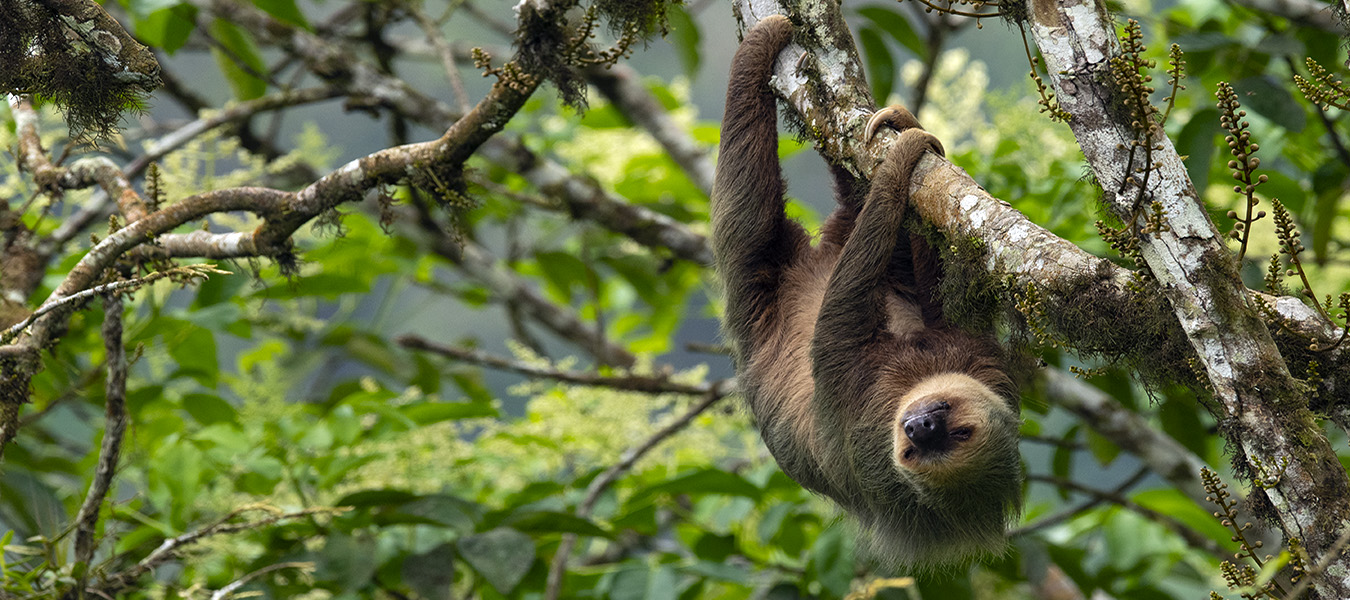
Partnerships with local leaders catalyzes conservation success
As pressure mounts to cut tropical forests – for urbanization, agriculture, and mining – time is running out to save what is left. Tropical forests protect biodiversity, but also benefit us all. The El Pahuma and Lalo Loor reserves harbor over 180 spectacular orchids, 50 unique mammals, and 360 glittering bird species, not to mention all the trees and insects. Forests make our planet habitable for people: trees soak up CO2 and cool the ground, sheltering us from climate change, and streamside vegetation filters run-off, keeping water clean. Forests are sources of essential resources like timber, fruits, fuelwood, and thatch, and offer spaces for people to connect with nature, recreate, and unwind. Doesn’t it seem fair that the people who protect these ecosystems for all of us should be compensated for doing so?
With the help of our donors and the U.S. Fish & Wildlife Service, Ceiba is promoting a range of conservation incentives in coastal Ecuador. Our team provided legal support to county governments, who now give tax rewards to people that protect forest within the 440,000-acre Conservation and Sustainable Use Area declared in 2020. Incentives, both financial and technical, bring meaningful benefits to people who want to conserve their land but may not know where to start nor have the means to do so.
Like Elio Velasco, who is better able to protect his 230-acre forest thanks to the tax break, and other benefits provided via Ceiba’s latest conservation easement. And Pastora Loor, who is restoring streambanks on her farm with the help of tree seedlings, fencing, and a water tank to keep her cattle out of the stream. In the past two years, Ceiba has helped over 30 landowners plan conservation actions, reforested more than 600 acres, and bolstered 8 local plant nurseries so residents have ready access to native trees.
Ecuador’s coastal forest has suffered some of the highest rates of loss in South America. But Ceiba’s team of committed communities, forward-thinking governments, and dedicated donors is making a difference, one that conserves forests, and helps us all.
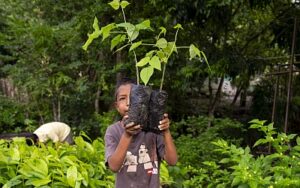 During our 25 years of conservation work in Ecuador, Ceiba has always placed local partners at the center of what we do. These partnerships recognize the value of local knowledge and capacity, while emphasizing that conservation is a shared responsibility, requiring growth and the application of new ideas. Our new Conservation Partners network recognizes that implementing ideas, both innovative and time-tested, often requires a catalyst. Ceiba will offer Seeds of Sustainability grants to bolster conservation projects in the tropics led by local groups or individuals who become members of our partner network.
During our 25 years of conservation work in Ecuador, Ceiba has always placed local partners at the center of what we do. These partnerships recognize the value of local knowledge and capacity, while emphasizing that conservation is a shared responsibility, requiring growth and the application of new ideas. Our new Conservation Partners network recognizes that implementing ideas, both innovative and time-tested, often requires a catalyst. Ceiba will offer Seeds of Sustainability grants to bolster conservation projects in the tropics led by local groups or individuals who become members of our partner network.
We will leverage our years of diverse experiences to help others get their projects swiftly up and running. An advisory panel composed of subject experts, alumni, and donors will help discover potential partners, identify needs and priorities, and review project proposals. Partners will interact with each other and the panel to share effective strategies, resources, and lessons learned, and successful projects will be eligible for additional support.
This coming year we welcome partners focused on environmental education and community-led marine conservation, including several initiatives in Ecuador and Belize. Please join us in supporting our Conservation Partners!
This year Ceiba worked with three local partners who share our passion for education. We invited students from the schools of Tabuga, Camarones, and Jama (our neighbors) to connect with nature at the Lalo Loor Reserve, one of the only protected semi-deciduous forests on Ecuador’s coast. They learned the value of preserving this ecosystem, how we rely on forests for clean water, and discovered the extraordinary species that live here, like sloths, howler monkeys, and toucans. Interns from the nearby town of Jama led their younger peers through the forest, allowing our interns to pass on what they’ve learned and encourage the kids to appreciate their native fauna and flora. Given that many families in this region lack even basic educational resources, it is vital for conservation to engage with younger generations. We are grateful to these schools for being amazing community partners and for facilitating such impactful field trips.
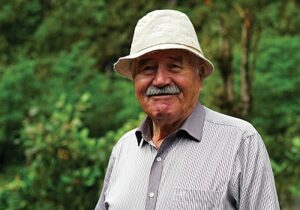 Efraín Lima, founding owner of the El Pahuma Orchid Reserve passed away on November 2, 2023. It was with Mr. Lima that the Ceiba Foundation signed South America’s first conservation easement, to protect his pristine Andean cloud forest. He was passionately dedicated to conservation, and inspired a movement in forest protection and ecotourism in the region. He leaves behind three generations who remain committed to El Pahuma’s forest and its biodiversity, and Ceiba is standing with them to continue his conservation legacy.
Efraín Lima, founding owner of the El Pahuma Orchid Reserve passed away on November 2, 2023. It was with Mr. Lima that the Ceiba Foundation signed South America’s first conservation easement, to protect his pristine Andean cloud forest. He was passionately dedicated to conservation, and inspired a movement in forest protection and ecotourism in the region. He leaves behind three generations who remain committed to El Pahuma’s forest and its biodiversity, and Ceiba is standing with them to continue his conservation legacy.
Students learn by doing in the Amazon
More than 650 students have studied abroad with Ceiba, and our alumni consistently tell us about the positive impacts of their experience. Research shows that students who study abroad benefit through improved job prospects, and higher starting salaries. Participants in our Coral Reef Ecology course in Belize learn to carry out research on the world’s second-largest barrier reef, and interact with Belizean fisheries managers. On the Tropical Conservation Semester (TCS), students explore Ecuador’s Andes mountains, Galapagos islands, and Amazon rainforest – with our partners at the Tiputini Biodiversity Station – while contributing to conservation, embedding in local culture and language, and learning hands-on field research skills (see Alumni Spotlight ).
One benefit of studying abroad is “cultural competency”, understanding cultures different from your own. Ceiba prioritizes local voices and authentic interactions, and is shifting TCS leadership to two of our talented Ecuadorian staff: María José Rendón (Program Coordinator) and Sebastián Andrade (Co-Instructor) will forge deeper connections between our students and the diverse people, cultures, and environments that make Ecuador such a vibrant country.
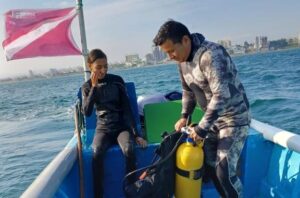 People who connect with nature early in life are inspired to protect it. Ceiba partnered with A Mano Manaba to launch “Bosque Mar,” a program that connects teenagers from rural communities with their own back yard: the big blue ocean. In Ecuador, many rural economies depend on fishing, but few children have a chance to explore the sea. Our program taught 12 teenagers to snorkel, and 8 to master scuba diving. They discovered wonders under the waves, and now see the importance of saving marine turtles and sharks from plastic waste and overfishing. The group joined a local university’s (PUCEM) coral restoration program (image at left), and now are developing a Plastic Free project in their community of Don Juan.
People who connect with nature early in life are inspired to protect it. Ceiba partnered with A Mano Manaba to launch “Bosque Mar,” a program that connects teenagers from rural communities with their own back yard: the big blue ocean. In Ecuador, many rural economies depend on fishing, but few children have a chance to explore the sea. Our program taught 12 teenagers to snorkel, and 8 to master scuba diving. They discovered wonders under the waves, and now see the importance of saving marine turtles and sharks from plastic waste and overfishing. The group joined a local university’s (PUCEM) coral restoration program (image at left), and now are developing a Plastic Free project in their community of Don Juan.
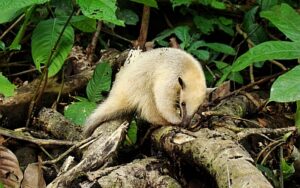 A diet of leaves can be tough, but sloths embrace it with open arms. They boast the lowest metabolism of any mammal, and rely on special gut microbes to digest the low-energy leaves. Hoffman’s two-toed sloths (Choloepus hoffmanni, banner image by Murray Cooper) inhabit Ecuadorian coastal forests like the Lalo Loor Reserve, and can succeed even in small patches. Like other formerly abundant animals, though, they disappear when habitat is destroyed. Ceiba fights to protect the region’s remaining forest, so sloths – and other gentle tree-dwellers like anteaters (image), kinkajous, and howler monkeys – don’t land on the endangered list. Conservation is a slow process, but sloths make it all worthwhile!
A diet of leaves can be tough, but sloths embrace it with open arms. They boast the lowest metabolism of any mammal, and rely on special gut microbes to digest the low-energy leaves. Hoffman’s two-toed sloths (Choloepus hoffmanni, banner image by Murray Cooper) inhabit Ecuadorian coastal forests like the Lalo Loor Reserve, and can succeed even in small patches. Like other formerly abundant animals, though, they disappear when habitat is destroyed. Ceiba fights to protect the region’s remaining forest, so sloths – and other gentle tree-dwellers like anteaters (image), kinkajous, and howler monkeys – don’t land on the endangered list. Conservation is a slow process, but sloths make it all worthwhile!
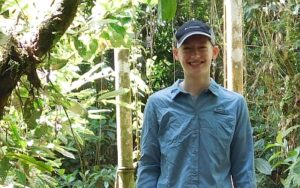 Ceiba’s Tropical Conservation Semester (TCS 2012) offered me the opportunity to explore stunning environments while gaining Spanish language skills and cross-cultural exposure. The defining part of my TCS experience was interning with primate researchers at the Tiputini Biodiversity Station in the Amazon. From my first day trekking in one of the most biodiverse places on Earth, I was immersed in the fascinating lives of rainforest monkeys, and it set the trajectory for my future career.
Ceiba’s Tropical Conservation Semester (TCS 2012) offered me the opportunity to explore stunning environments while gaining Spanish language skills and cross-cultural exposure. The defining part of my TCS experience was interning with primate researchers at the Tiputini Biodiversity Station in the Amazon. From my first day trekking in one of the most biodiverse places on Earth, I was immersed in the fascinating lives of rainforest monkeys, and it set the trajectory for my future career.
After graduating from UW Madison I held various research jobs, but my heart was always in Ecuador. In 2017 I returned to Tiputini for 6 months as an assistant, which led to a PhD in biological anthropology at UT Austin studying South American monkeys; my own field research at Tiputini will begin next summer. As a teaching assistant, I’ve shared my experiences with students and provided the kind of guidance I received from Ceiba. May those students considering careers in ecology and conservation all enjoy their own “Aha!” moments.
Want to keep up to date with Ceiba’s projects? Sign up for our quarterly newsletter.
We promise we will never sell your contact information to anyone else, ever!
Kapok is the Malay name of the Ceiba tree, Ceiba pentandra. The seeds of the Ceiba, or silk cotton tree, are embedded in a silky fluff known as kapok, packed inside a large pod. When the pod splits open, the fibers carry the seeds away on the wind. We named our newsletter Kapok to represent the “spreading of seeds” of information, and the love of nature.